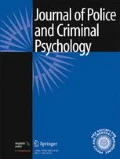Abstract
In the current study we hypothesized – and found – that coercive interviewing increased the incidences of false accusations made by eyewitnesses. Fifty-nine university students participated in a laboratory study in participant-confederate pairs and were later interviewed about whether the confederate stole a research assistant’s cell phone. Participants interviewed using a Coercive Interview were significantly more likely to falsely accuse the confederate of stealing a cell phone than were participants interviewed using a non-coercive, Control Interview. Our findings raise questions regarding why participants gave false accusations and whether coercive methods could result in more accurate testimony from reluctant witnesses. We suggest the need for potential safeguards, such as the electronic recording of interviews of non-suspect witnesses to prevent or document the use of coercive methods.
References
Asch SE (1956) Studies of independence and conformity: A minority of one against a unanimous majority. Psychological Monographs 70(9):1–70
Bruck M, Melnyk L (2004) Individual differences in children's suggestibility: A review and synthesis. Applied Cognitive Psychology 18(8):947–996. doi:10.1002/acp.1070
Cialdini R (2009) Influence: Science and practice, 5th edn. Allyn & Bacon, Boston
Cutler BL, Findley KA, Moore TE (2014) Interrogations and false confessions: A psychological perspective. Canadian Criminal Law Review 18:153–170
Drizin SA, Leo RA (2004) The problem of false confessions in the post-DNA world. North Carolina Law Review 82:891–1007
Fisher RP, Schreiber Compo N, Rivard J, Hirn D (2014) Interviewing Witnesses. In: Perfect T, Lindsay S (eds) The Sage Handbook of Applied Memory. Sage Publications, Los Angeles, pp 559–578
Guyll M, Madon S, Yang Y, Lannin D, Scher K, Greathouse S (2013) Innocence and resisting confession during interrogation: Effects on psychological activity. Law and Human Behavior 37(5):366–375
Inbau FE, Reid JE, Buckley JP, Jayne BC (2013) Criminal interrogation and confessions, 5th edn. Jones & Bartlett Learning, Burlington, MA
Kaasa SO, Cauffman E, Clarke-Stewart KA, Loftus EF (2013) False accusations in an investigative context: Differences between suggestible and non-suggestible witnesses. Behavioural Sciences and the Law 31(5):574–592. doi:10.1002/bsl.2075
Kassin SM, Drizin SA, Grisso T, Gudjonsson GH, Leo RA, Redlich AD (2010) Police-induced confessions: Risk factors and recommendations. Law and Human Behavior 34(1):3–38
Kassin S, Fein S, Markus HR (2011) Social psychology, 9th edn. Wadsorth Cengage Learning, Belmont, CA
Kassin SM, Kiechel KL (1996) The social psychology of false confessions: Compliance, internalization, and confabulation. Psychological Science 7(3):125–128. doi:10.1111/j.1467-9280.1996.tb00344.x
Kelman HC, Hovland CI (1953) “Reinstatement” of the communicator in delayed measurement of opinion change. Journal of Abnormal and Social Psychology 48(3):327–335
Leo RA (1996) Inside the interrogation room. The Journal of Criminal Law and Criminology 86(2):266–303. doi:10.2307/1144028
Leo, R. A. & Davis, D. (2010). From false confession to wrongful conviction: Seven psychological processes. The Journal of Psychiatry & Law, 38/Spring-Summer, 9-56.
Loftus EF, Pickrell JE (1995) The formation of false memories. Psychiatric Annals 25(12):720–725
Moore, T. E., Cutler, B. L., & Shulman, D. (2014). Shaping eyewitness and alibi testimony with coercive interview practices. The Champion, October, 34-40.
Moore TE, Fitzsimmons CL (2011) Justice Imperiled: False Confessions & the Reid technique. Criminal Law Quarterly 57(4):509–542
Norris RJ, Redlich AD (2012) At-risk populations under investigation and at trial. In: Cutler BL (ed) Conviction of the innocent: Lessons from psychological research. American Psychological Association Press, Washington DC, pp 11–32
Petty RE, Cacioppo JT (1986) Communication and persuasion: Central and peripheral routes to attitude change. Springer-Verlag, New York
Pornpitakpan C (2004) The persuasiveness of source credibility: A critical review of five decades’ evidence. Journal of Applied Social Psychology 34(2):243–281
Russano M, Meissner C, Narchet F, Kassin S (2005) Investigating true and false confessions in a novel experimental paradigm. Psychological Science 16(6):481–486
Tobin SJ, Raymundo MM (2009) Persuasion by casual arguments: The motivating role of perceived causal expertise. Social Cognition 27(1):105–127
R. v. Morgan, 2013 ONSC 6462, [2013] O.J. No. 5827.
State v. Lawson, 352 Or. 724, 291 P.3d 673 (2012)
Author Notes
The authors wish to thank Virginia Brown, Kayla Deroux, Nicole Smith, and Elizabeth Solodukhin for their assistance with data collection and Tim Moore and David Shulman for their comments on an earlier draft of this manuscript.
Author information
Authors and Affiliations
Corresponding author
Rights and permissions
About this article
Cite this article
Loney, D.M., Cutler, B.L. Coercive Interrogation of Eyewitnesses Can Produce False Accusations. J Police Crim Psych 31, 29–36 (2016). https://doi.org/10.1007/s11896-015-9165-6
Published:
Issue Date:
DOI: https://doi.org/10.1007/s11896-015-9165-6

